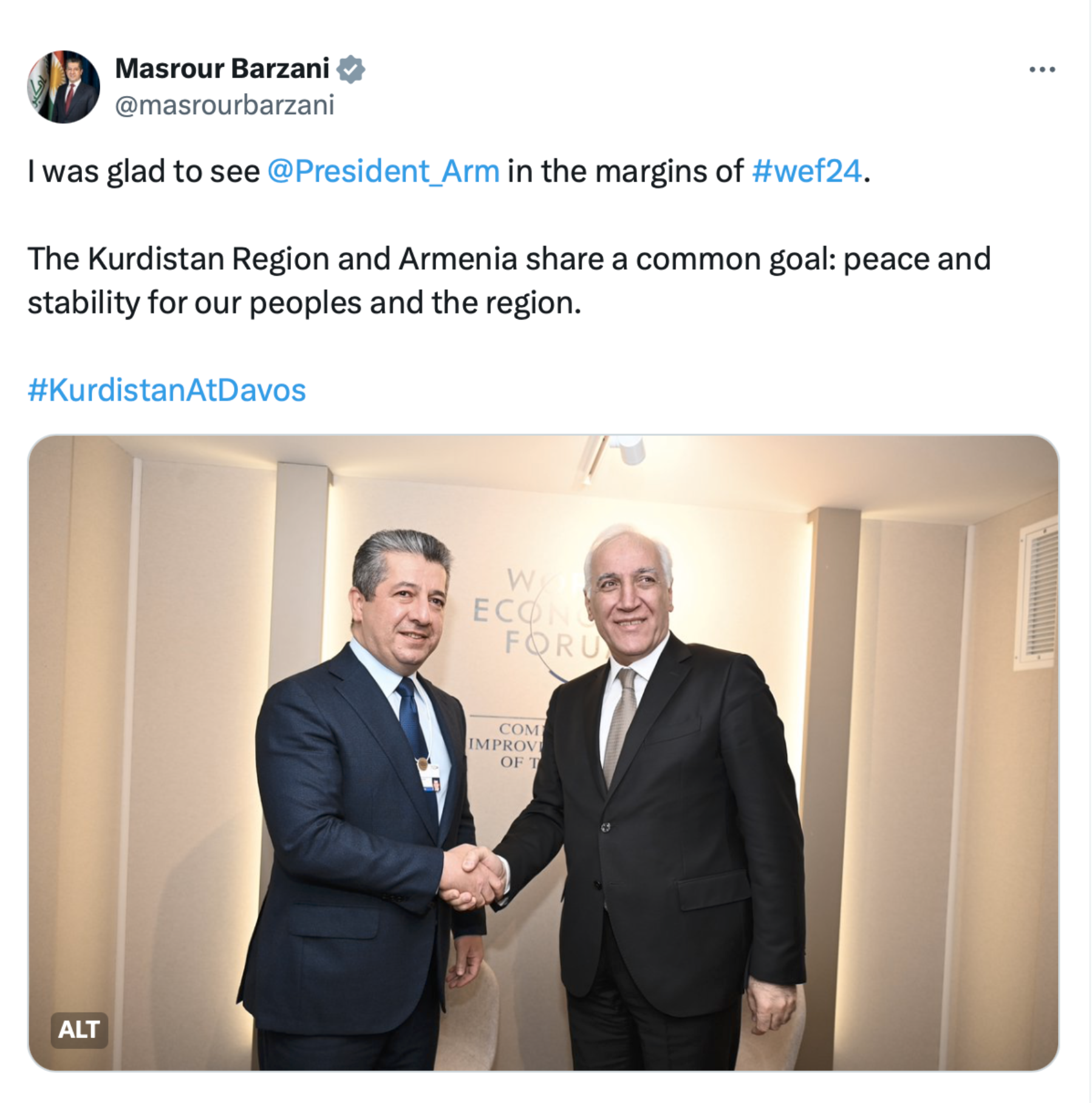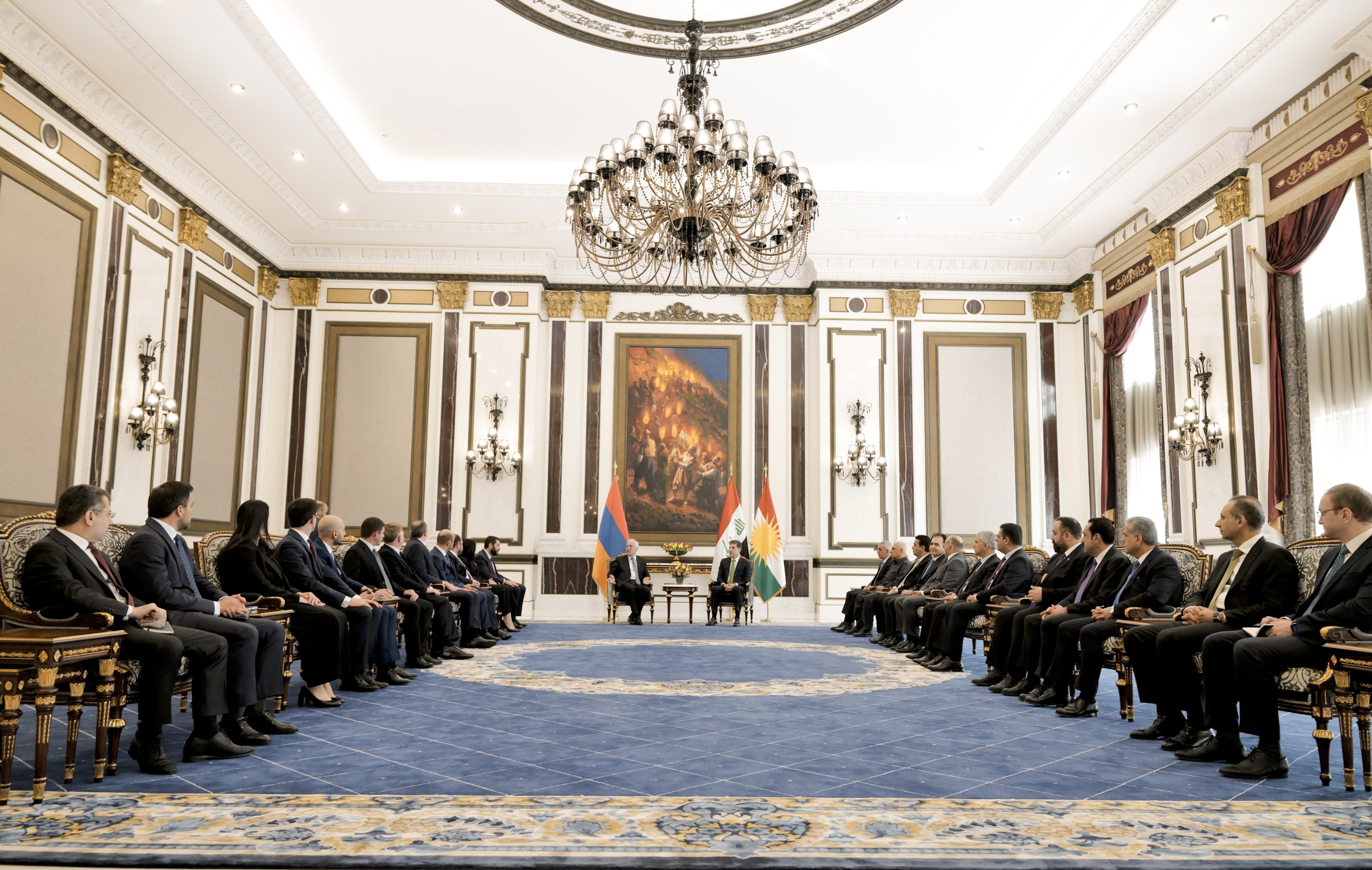After visiting Baghdad, Armenian President Vahagn Khachaturyan visited Erbil on February 29 for the first time and was received by Kurdistan Region President Nechirvan Barzani. He also met with President Masoud Barzani and Kurdistan Regional President Nechirvan Barzani, and visited the Armenian Church of the Holy Cross in Erbil.
“This was a historical visit and will definitely serve as a positive incentive for strengthening relations between Armenia and the Kurdistan Region,” Andranik Harutyunyan, acting Chief of Mission of the Consulate General of the Republic of Armenia, told Kurdistan Chronicle.
“President Khachaturyan’s visit was met with warm reception and kind hospitality, for which I would like to express my appreciation to the authorities of the Kurdistan Region.”
The Kurdistan Region Presidency said in a readout of the meeting that President Khachaturyan and Kurdistan Region’s President Nechirvan Barzani discussed opportunities to develop Armenian relations with Iraq and the Kurdistan Region in the areas of commerce, investment, the private sector, healthcare and tourism.
They also highlighted the opportunities for direct flights between Armenia and Iraq and the Kurdistan Region.
Prior to his visit to the Kurdistan Region, President Vahagn Khachaturyan also met with KRG Prime Minister Masrour Barzani on January 18 on the sidelines of the Davos Forum.
“The Kurdistan Region and Armenia share a common goal: peace and stability for our peoples and the region,” Prime Minister Barzani said in a post on X on January 18.
The Consulate General of Armenia was first opened in Erbil in 2021. Since then, relations between Armenia and the Kurdistan Region have blossomed, focusing on trade as well as economic, cultural, educational, scientific, and humanitarian activities, with the consulate organizing several events in the Kurdistan Region.
For instance, the Diplomatic School of the Ministry of Foreign Affairs of Armenia has conducted three consecutive annual training programs for the junior officials of various governmental agencies of the Kurdistan Region. Moreover, the Consulate General, in cooperation with the KRG Ministry of Culture and Youth, organized two exhibitions in Erbil and Sulaymaniyah featuring archive documents and historical photographs of Kurds, Yezidis, and Assyrians living in Armenia.
“Armenia also makes practical efforts to assist in the preservation and recovery of the ancient manuscripts held in the Digital Center of Oriental Manuscripts (CNMO) in Erbil,” Harutyunyan added. Currently, Armenian experts from the Mesrop Mashtots Institute of Ancient Manuscripts are conducting the third training course for CNMO staff.
Armenia has also worked on creating cooperation between Kurdish and Armenian universities and academic centers. As part of this initiative, two academic visits were conducted by Armenian professors of Kurdology to the Kurdistan Region, where they held lectures at several universities and the Academy of science.
Additionally, in 2022 the Government of Armenia provided humanitarian assistance to the Yezidi internally displaced persons in the Kurdistan Region in cooperation with the Barzani Charity Foundation.

Economic partnership
Harutyunyan said that Armenia attaches particular importance to developing economic relations with the Kurdistan Region.
“Within the delegation of the Armenian President, a business group representing different sectors arrived in Erbil and held meetings with the KRG Minister of Trade and Industry, as well as with the newly elected boards of the Erbil Chamber of Commerce and Industry.”
President Khachaturyan also visited the ancient Erbil citadel, including its famous Textile Museum. In the citadel, he was guided by the Head of the High Commission for Erbil Citadel Revitalization Nehad Latif Qoja and Erbil Governor Omed Khoshnaw.
“Both Kurds and Armenians are committed to protecting minority rights and promoting cultural and linguistic diversity in their countries,” Qoja posted on X.

Cultural ties
There are an estimated 3,000 Armenians across the Kurdistan Region, including 1,000 Armenians in Zakho.
The Kurdistan Region Constitution recognizes Armenians as an ethnic component, which gives them the right to have access to education in the Armenian language, and reserves one seat in the Kurdistan Region Parliament for Armenians.
However, on February 23, the Federal Supreme Court of Iraq abolished 11 minority quota seats in the Kurdistan Region Parliament, including the one seat for Armenians.
“In the Kurdistan Region, Armenians can freely practice their faith and enjoy all rights necessary to preserve their identity. Five Armenian churches operate in the Kurdistan Region. I would like to express our gratitude to the authorities of the KRG for the care they have shown towards our compatriots,” Harutyunyan said.
The Erbil Governorate in a press release also said President Khachaturyan “expressed gratitude for the KRG’s efforts in fostering a peaceful atmosphere that promotes tolerance and harmonious coexistence among various sects and religions.”
The KRG authorities and the local community have also focused on preserving Armenian churches in the Kurdistan Region. The Church of the Holy Cross in Ankawa, a district of Erbil, was opened in April in 2019, with a total area of 5,309 square meters. Moreover, an Armenian church in Zakho is being rebuilt with the help of the KRG and will most likely open in the spring of 2024.
During his visit, President Khachaturyan visited the Church of the Holy Cross, accompanied by Bishop Oshakan Gulgulyan, Primate of the Diocese of the Armenian Church of Iraq, as well as a number of high level officials from the Kurdistan Region.
“It should be noted that the Armenian church was built with the financial support of the authorities of the Kurdistan Region. President Khachaturyan toured the church and laid a wreath at the memorial dedicated to the victims of the Armenian Genocide in the Ottoman Empire,” Harutyunyan added.
President Khachaturyan also met with representatives of the Armenian community.
“During the meeting, President Khachaturyan presented in detail the general situation and developments in Armenia’s internal and foreign policy and economic and public life, had conversation with the attendees, and answered numerous questions,” Harutyunyan said.
He underlined that the questions mainly covered relations between Armenia and the Kurdistan Region, as well as the political and economic situation in Armenia.
“It was a unique opportunity for our compatriots to meet President Khachaturyan and be directly informed about the current situation in Armenia,” Harutyunyan added.
There is a large Kurdish community living in Armenia, and Armenian Prime Minister Nikol Pashinyan congratulated the community on Newroz. “May this beautiful spring holiday bring happiness to our entire Kurdish community,” he said on March 21.
“The visit of President Khachaturyan aimed to further deepen cooperation and contribute to exploring new avenues for collaboration in high-tech industry, green energy, healthcare, and digital management. I am confident that through joint efforts our cooperation will deepen and develop in various sectors. There is a mutual readiness to enlarge the collaboration,” Harutyunyan concluded.